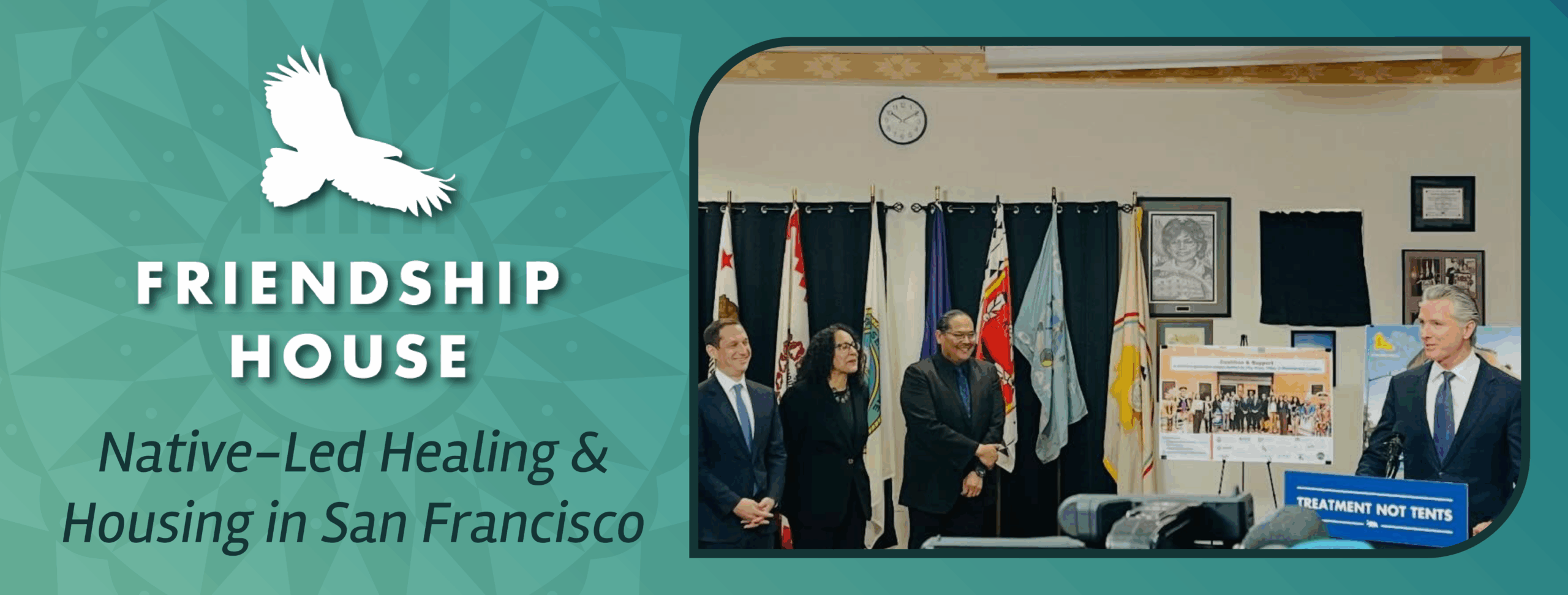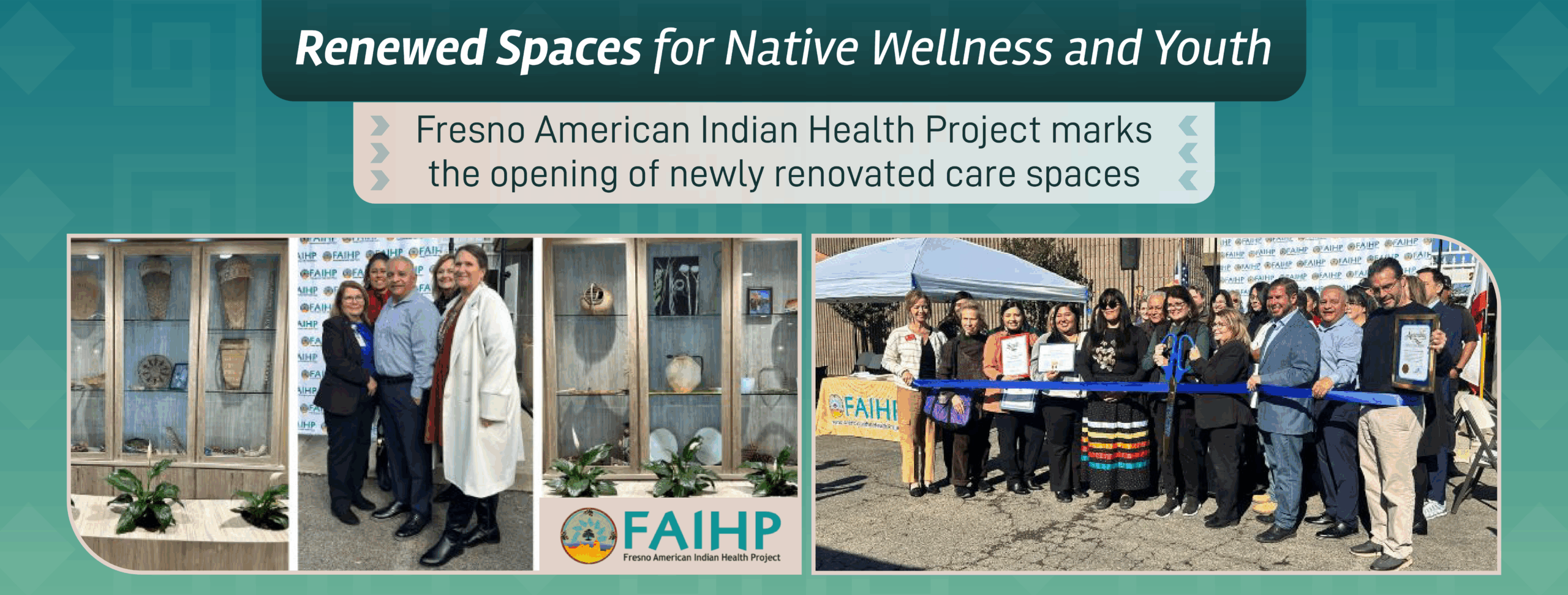In this Edition:
- 🏛 National Policy Convenings: State of Indian Nations, Executive Council Winter Session, Tribal Summit, and Family Welfare Hill Day
- 💰 Fiscal Year 2028 Indian Health Service Budget Formulation: Urban Indian Health Elevated Across Areas
- 💰 Appropriations Updates: Labor–Health and Human Services
- 🏥 Medicaid Federal Medical Assistance Percentage Advocacy
- 🏥 Indian Health Service Realignment: Comments Due February 27
- 💡 Rural Health Transformation Fund: Request for Urban Indian Organizations
- 📅 Upcoming Events and Key Dates
- 📍 NCUIH Update: 2026 Annual Conference and Awards Nominations
National Policy Convenings Shaping the Year Ahead
February brought several major national convenings where urban Indian health priorities were elevated and reinforced.
National Congress of American Indians State of Indian Nations and Executive Council Winter Session

February 9–12, 2026 | Washington, District of Columbia
NCUIH attended the National Congress of American Indians State of Indian Nations Address and Executive Council Winter Session to engage with Tribal leaders and partners from across Indian Country.

February 11, 2026
During the Winter Session, NCUIH co-led the Family Welfare Hill Day preparation session alongside:
- National Indian Health Board
- National Congress of American Indians
- National Indian Child Welfare Association
This session strengthened coordinated advocacy efforts ahead of congressional engagement on family welfare and health priorities.
Indian Health Service 70th Anniversary Tribal Summit

February 12, 2026
At the Indian Health Service 70th Anniversary Tribal Summit, NCUIH was honored for its commitment to improving health for Native people living in urban areas.
Additionally, Department of Health and Human Services (HHS) Secretary Kennedy addressed Tribal leaders and recommitted to strengthening Indian health. He announced that HHS will be transferring $1 billion in unused HHS funds to address IHS priority infrastructure projects starting in FY 2027. Secretary Kennedy mentioned that currently there is an $8 billion construction deficit, and the transfer will target “shovel-ready” projects with facility conditions currently hindering patient care and workforce recruitment.
Secretary Kennedy also highlighted the renewed behavioral health efforts from the Indian Health Service and the Substance Abuse and Mental Health Services Administration, the need for continued engagement with Tribal Nations, and the importance of Native-led care models.
National Health Council Health Leadership Conference

February 13, 2026
NCUIH CEO, Francys Crevier J.D. (Algonquin), joined Tracy Hart, CEO of the Osteogenesis Imperfecta Foundation, and Brian Smith of Merck & Co. at the National Health Council Health Leadership Conference.
The discussion elevated urban Indian health within national patient-centered care conversations and highlighted the importance of including Urban Indian Organizations in broader health system discussions.
Fiscal Year 2028 Indian Health Service Budget Formulation: Urban Indian Health Elevated Across Areas

At the Indian Health Service Tribal Budget Formulation Work Session, Tribal representatives discussed how Indian Health Service funding is prioritized and distributed. Urban Indian Organizations and NCUIH participated and emphasized the need for additional resources for urban Indian health.
Multiple Indian Health Service Areas elevated urban Indian health as a priority.
Highlights include:
- Bemidji Area: “Urban Health” listed as Priority 6; recommended $234 million increase.
- Billings Area: “Urban Indian Health” listed as Priority 8; recommended $588,364,000.
- California Area: “Urban” listed as Hot Topic 1.
- Great Plains Area: “Urban Indian Health” listed as Priority 7; recommended $382,438,000.
- Nashville Area: Included funding increases for Urban Indian Health Programs in standing priorities.
- Navajo Area: “Urban” listed as Priority 3; recommended $2.1 billion.
- Oklahoma City Area: “Urban Health” listed as Priority 5; recommended $127.4 million; also elevated 100 percent Federal Medical Assistance Percentage as a hot topic.
- Phoenix Area: Included increased Urban Indian Health funding as Hot Issue 12.
- Portland Area: Recommended a 2 percent increase for Urban Health.
- Tucson Area: Recommended $383 million to expand Urban programs.
Strong area-level prioritization reinforces the need for sustained federal investment in urban Indian health nationwide.
Appropriations Updates
Labor–Health and Human Services Appropriations
- On February 3, 2026, Congress passed a three-bill appropriations minibus for fiscal year (FY) 2026, which included the appropriations bill for Labor, Health and Human Services, Education, and Related Agencies (Labor-HHS).
The bill included key provisions for Indian Country:
- $116.6 billion for HHS
- $200 million for SDPI, $41 million increase.
- $27 million, $3 million increase, for the Good Health and Wellness in Indian Country program
- $9 million, $3 million increase, for the Improving Native American Cancer Outcomes program
- $25.67 million, $2 million increase, for the Tribal Behavioral Health Grants (Native Connections)
- No less than $6 million for the Minority HIV/AIDS Fund – Tribal Set Aside
- 15% Tribal set-aside (includes UIOs) for the National Health Service Corps
Indian Health Service Realignment:
Comments Due February 27, 2026

The Indian Health Service is accepting written comments on its proposed agency realignment.
Deadline: February 27, 2026
Urban Indian Organizations are encouraged to submit feedback.
Rural Health Transformation Fund:
Let NCUIH Know
If your Urban Indian Organization receives funding through the Rural Health Transformation Fund, please notify NCUIH so we can better understand the impact and support continued engagement.
Upcoming Events and Key Dates Requests for Information

- February 27, 2026:Indian Health Service Realignment Comments Due
- March 6, 2026:Early Bird Registration rates for NCUIH Annual Conference end
- March 13, 2026:NCUIH Annual Conference Award Nominations Close
- April 27–30, 2026: 2026 NCUIH Annual Conference, The Westin Downtown, Washington, District of Columbia
2026 NCUIH Annual Conference

Early Bird Registration Ends Next Month
Join us April 27–30, 2026, in Washington, D.C., as NCUIH marks the 50th anniversary of the Indian Health Care Improvement Act (IHCIA)—a landmark commitment to the health and well‑being of American Indians and Alaska Natives—and reflects on five decades of progress, collaboration, and continued commitment to Native health.
The conference provides a vital platform for:
- Urban Indian Organizations
- Health care professionals
- Policymakers
- Community leaders and advocates
Register by March 6 to receive the Early Bird rate.
Call for Award Nominations

We are now accepting nominations for the 2026 NCUIH Annual Conference Awards, recognizing individuals whose leadership and service have strengthened Urban Indian health systems and uplifted Native communities across the country.
- UIO Staff Member of the Year
- UIO Visionary Award
- Urban Indian Legacy Award
- Tribal Leader Impact Award
We encourage Urban Indian Organizations, Tribal leaders, and partners to submit nominations honoring individuals who are making a lasting impact in urban Native health.
Submissions due Friday, March 13, 2026 by 11:59 PM ET.
Recent NCUIH Policy Blogs
- Friendship House Celebrates Investment in Healing-Centered Housing in San Francisco
February 3, 2026/in Policy Blog/by River Carroll
- Congress Passes Labor Health and Human Services Spending Bill, Includes $200 million for Special Diabetes Program for Indians
February 4, 2026/in Policy Blog/by Jeremy Grabiner
About NCUIH
The National Council of Urban Indian Health (NCUIH) is a national representative for the 41 Urban Indian Organizations contracting with the Indian Health Service under the Indian Health Care Improvement Act. NCUIH is devoted to the support and development of high quality and accessible health and public health services for American Indian and Alaska Native people living in urban areas.
NCUIH respects and supports Tribal sovereignty and the unique government-to-government relationship between our Tribal Nations and the United States. NCUIH works to support those federal laws, policies, and procedures that respect and uplift Tribal sovereignty and the government-to-government relationship. NCUIH does not support any federal law, policy, or procedure that infringes upon or in any way diminishes Tribal sovereignty or the government-to-government relationship.








